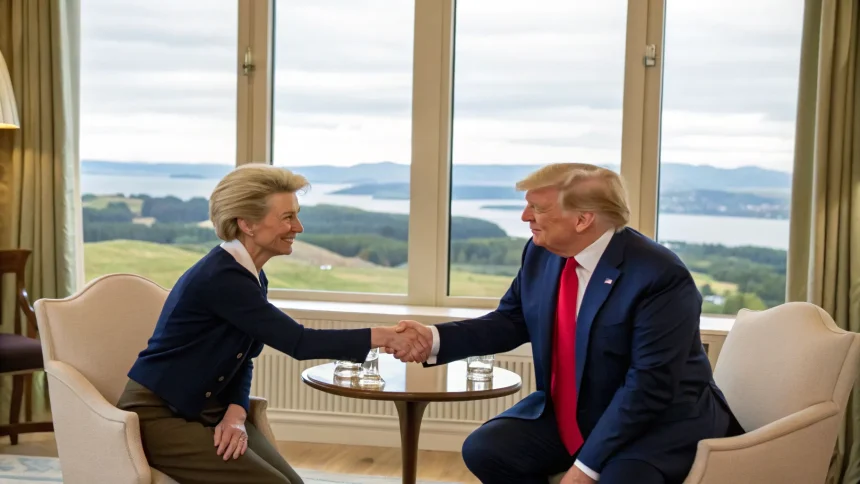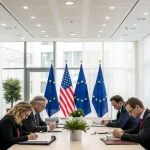U.S. President Donald Trump planned to meet with European Commission President Ursula von der Leyen on Sunday in Scotland, taking a break from golfing to discuss trade matters. The meeting comes as both sides seek an agreement on tariff rates.
The high-level talks in Edinburgh mark an important moment in U.S.-EU trade relations, with both leaders looking to address ongoing economic tensions. Trump, who has been staying at his Scottish golf resort, paused his recreational activities for the diplomatic engagement.
Trade Negotiations at Center Stage
The meeting between Trump and von der Leyen focuses primarily on resolving disagreements about tariffs that have created friction between the United States and European Union in recent years. Both parties appear motivated to find common ground on trade policies that have sometimes put the transatlantic allies at odds.
Economic analysts note that tariff discussions between the U.S. and EU have significant implications for global trade patterns. Any agreement reached could affect billions of dollars in goods exchanged between the two economic powerhouses.
Von der Leyen, who has led the European Commission since 2019, has previously expressed interest in working with the U.S. administration to reduce trade barriers while protecting European economic interests.
Scotland as Diplomatic Backdrop
The choice of Scotland for this meeting adds an interesting dimension to the talks. Trump, who owns golf properties in Scotland including Trump Turnberry, has combined his business interests with diplomatic affairs during this visit.
Edinburgh, Scotland’s historic capital, provides a neutral setting for the discussions away from both Brussels and Washington. The meeting location allows for more informal exchanges between the leaders while Trump is already in the country for personal business.
Scottish officials have not commented extensively on the high-profile diplomatic meeting taking place in their jurisdiction, though security measures were reportedly increased around the meeting venue.
Broader Economic Implications
Trade experts point to several key issues likely on the agenda:
- Steel and aluminum tariffs imposed by the U.S. in 2018
- European taxes on American technology companies
- Agricultural product standards and market access
- Automotive sector tariffs and regulations
The outcome of these discussions could influence not only U.S.-EU economic relations but also set the tone for broader international trade negotiations. Both economies have faced challenges from the COVID-19 pandemic and subsequent supply chain disruptions, adding urgency to finding workable trade solutions.
“These talks represent an opportunity to reset certain aspects of the transatlantic economic relationship,” said a European trade official familiar with the preparations for the meeting.
Neither side has publicly stated expectations for concrete outcomes from this particular meeting, suggesting it may serve as a preliminary discussion rather than a final negotiation session.
As global economic competition intensifies, particularly with China’s growing influence, the U.S. and EU have mutual interests in coordinating their trade approaches despite ongoing disagreements on specific policies.
The meeting concludes Trump’s time in Scotland before he continues with other scheduled activities on his European trip. Whether the golf-interrupted trade talks will lead to meaningful progress remains to be seen as both sides navigate their complex economic relationship.









